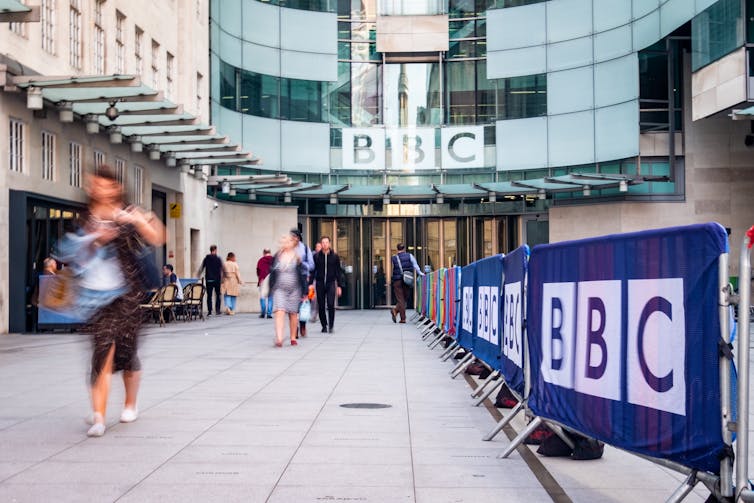The TV licence is as much part of British life as the BBC, which it helps to fund. But in an era of increased media choice – much of it available online, through voluntary subscriptions or even for free – BBC director general Tim Davie has said it is right to ask questions about the “longevity” of this universal fee.
Critics say that the TV licence is an unfair burden on the less well-off, and that the BBC wastes public money while failing to live up to its declared commitment to political impartiality.
Conservative ministers have repeatedly hinted that the fee will be reformed or abolished. Late in 2023, the government launched an expert panel to examine the future of the licence and BBC funding. Now, Davie has promised a public consultation on the issue.
Currently, the law requires every UK household, with some exceptions, to pay a flat £169.50 annual charge if they watch any live television (BBC or other channels) or use BBC iPlayer. Davie suggested that a future arrangement might mean people on lower incomes paying less. He also said the threat of criminal prosecution faced by licence-fee evaders – a PR disaster for the BBC – might be limited or removed.
Why do viewers pay a licence fee?
When the BBC was founded in 1922, civil servants and wireless pioneers struggled to establish radio on a financially sustainable basis. American commercial broadcasting served as a warning. In their rush to make money, US entrepreneurs established stations without enough listeners or advertisers, and many quickly went bust.
British newspapers, meanwhile, worried that UK stations would steal their advertisers and readers, and lobbied hard to restrict the nascent BBC’s commercial activities.
The resulting compromise had little to do with any idealistic concept of an independent public service. The BBC was granted an official monopoly of all British radio, creating a single viable broadcaster.
To reduce opposition from newspaper companies, on-air advertising was ruled out, in favour of a listener licence fee. This fee had already been introduced by the government, long before the creation of the BBC, as a means to regulate amateur wireless experimenters. People who wanted to listen to BBC radio had to purchase a 10-shilling licence.
Over the following years, the BBC’s founding director general John Reith and others made a virtue of necessity, arguing that a non-commercial BBC was the best way to deliver public service broadcasting.
Because the BBC did not have to worry about selling airtime to advertisers, it could provide a universal service of the best programmes, containing something for everyone. Indeed, because it was funded by a universal fee, it had a duty to do so.
The licence fee also gave the BBC a measure of independence from politicians and civil servants. The government had the power to set the licence fee whenever it came up for renewal, but it could not turn the tap of funding on and off at will. The licence fee endured and in 1946 was raised to £1.
Those who wanted to watch the BBC’s fledgling television service (introduced in the 1930s but suspended during the second world war) had to pay double – and the TV licence was born.
Commercial BBC
The licence fee has never been the BBC’s only source of funding. The World Service was funded directly by the government until 2014. Perhaps paradoxically, given their emphasis on the need for independence, senior BBC managers have argued that this system should be reinstated.
The BBC also has a long history of generating commercial revenue without on-air advertising. This goes back to the 1923 launch of the Radio Times, which made money by printing advertisements. The BBC would go on to run a range of other profitable publications on a similarly commercial basis.
Commercial income increased during the 1960s and 1970s as television export sales grew. Margaret Thatcher’s government was famously hostile to the BBC, and resisted increases to the licence fee, as did its successors. To compensate, the BBC aggressively expanded its commercial revenue streams.
Private media enterprises pushed back, arguing that the BBC, unfairly assisted by a public subsidy in the TV license, was crowding them out of the marketplace. The BBC was obliged to sell off some of its most profitable commercial offshoots (including the Radio Times), and scale back others.

A universal fee still seems the most obvious way to fund Britain’s most important public broadcaster. William Barton/Shutterstock
If the licence fee goes, the BBC might once again try to survive by dramatically increasing its commercial revenues. Indeed, in March the BBC announced plans to introduce commercial advertising on its podcasts on platforms like Spotify and iTunes. And while Davie has said that the BBC remains committed to a universal fee, he also aims to double the revenue generated by its commercial arm, BBC Studios, to £3.2 billion by 2027-28.
There are already signs of a backlash from British media groups against Davie’s plans to expand BBC Studios, which produces much of the BBC’s own content, as well as content for other broadcasters and their platforms.
UK commercial media companies have already lost a great deal of advertising revenue as sponsors move online. They fear BBC Studios will compete for the remainder.
Could the licence fee be abolished?
If the TV licence were abolished and the public corporation dissolved, BBC Studios might carry on as a fully commercial concern, making BBC-branded programmes. But this would be a much-diminished version of the BBC, possibly unable (or unwilling) to mantain all the BBC’s current television and radio services.
A fully commercial BBC would have to compete directly other UK broadcasters for the very limited amount of advertising revenue that is available. This could reduce the diversity of the UK media industry and the amount of British-made content that produces. Global streaming services would benefit most from the resultant reduction in competition.
The TV licence still exists in part because it is difficult to find a viable alternative. A Netflix-style subscription model might work for iPlayer, but it would not support terrestrial television or radio, which many households (and particularly older people) still rely on.
Alternatively, direct government funding might undermine trust in the BBC in Britain and abroad. Would the UK really want a news service directly controlled by the state?
The sheer diversity of services provided by the BBC means that a universal fee still seems the most obvious way to fund Britain’s most important public broadcaster.



 FDA Targets Hims & Hers Over $49 Weight-Loss Pill, Raising Legal and Safety Concerns
FDA Targets Hims & Hers Over $49 Weight-Loss Pill, Raising Legal and Safety Concerns  Nvidia CEO Jensen Huang Says AI Investment Boom Is Just Beginning as NVDA Shares Surge
Nvidia CEO Jensen Huang Says AI Investment Boom Is Just Beginning as NVDA Shares Surge  SoftBank Shares Slide After Arm Earnings Miss Fuels Tech Stock Sell-Off
SoftBank Shares Slide After Arm Earnings Miss Fuels Tech Stock Sell-Off  Kroger Set to Name Former Walmart Executive Greg Foran as Next CEO
Kroger Set to Name Former Walmart Executive Greg Foran as Next CEO  TrumpRx Website Launches to Offer Discounted Prescription Drugs for Cash-Paying Americans
TrumpRx Website Launches to Offer Discounted Prescription Drugs for Cash-Paying Americans  Amazon Stock Rebounds After Earnings as $200B Capex Plan Sparks AI Spending Debate
Amazon Stock Rebounds After Earnings as $200B Capex Plan Sparks AI Spending Debate  Anta Sports Expands Global Footprint With Strategic Puma Stake
Anta Sports Expands Global Footprint With Strategic Puma Stake  Once Upon a Farm Raises Nearly $198 Million in IPO, Valued at Over $724 Million
Once Upon a Farm Raises Nearly $198 Million in IPO, Valued at Over $724 Million 
































